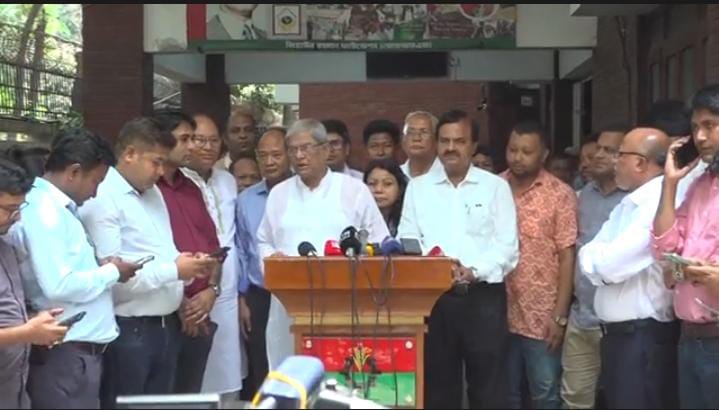News Flash
News Flash

DHAKA, July 23, 2025 (BSS) - Bangladesh Nationalist Party (BNP) Secretary General Mirza Fakhrul Islam Alamgir today said their party will build a prosperous Bangladesh integrating people from all religions and small ethnic groups in the country.
"Based on our 31-point charter, we have pledged to establish a Rainbow State in Bangladesh, and we are committed to working towards building a prosperous Bangladesh that includes all religions, ethnic groups and minority communities," he told journalists after a meeting with a delegation of Jatiyatabadi Small Ethnic Groups at BNP Chairperson's Gulshan office here.
A 20 member-delegation, led by president of the Jatiyatabadi Small Ethnic Group Mrigen Hagid, participated in the meeting while BNP Chairperson's Advisory Council Member and Chairman of the Hindu Buddhist Christian Welfare Front Bijon Kanti Sarkar was present.
Regarding verbal disputes among political parties, the BNP leader said, "These are part of politics. There will always be attempts to outmaneuver opponents with words, and there's nothing to worry about. A country progresses when there is politics."
Emphasizing the importance of democracy, he said, everyone must be given the opportunity to speak in a democracy for better solutions to emerge.
"In many cases, in a democracy, a hundred flowers must be allowed to bloom. Democracy means allowing everyone to speak and listening to them. Only then will a hundred flowers bloom, and a good fragrance and fresh air will flow from them," said the BNP Secretary General.
Regarding the proposal not to hold the positions of party chief and prime minister concurrently by one person, Mirza Fakhrul further said, it is merely a proposal. Discussions are ongoing, and opinions from all parties are being gathered. The final decision will be made through discussions.
About the meeting with the Chief Advisor last night (Tuesday), Mirza Fakhrul said, "He (Yunus) called for an exchange of views with all political parties which struggled and fought against fascism, and we had discussions there."
"If the government faces any crisis, they call us. We are committed, so we go. We will do whatever is necessary to uphold democracy. However, I believe that more frequent exchanges of views would have been better, as it might have prevented the emerging problems, he added.